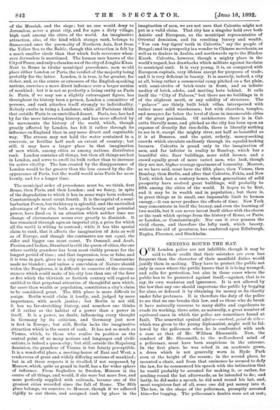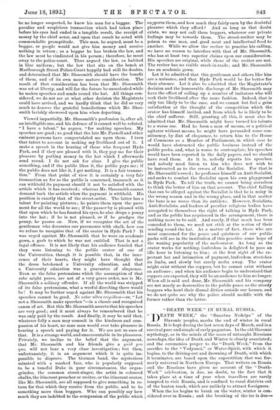SENDING ROUND THE HAT.
OUR London police are not infallible, though it may be said to their credit that their mistakes are even less. frequent than the character of their manifold duties would justify them in making. They have to protect the public not only in cases where the public knows that it is being wronged, and calls for protection, but also in those cases where the public has to be protected against itself,—against, that is to- say, its own weakness and ignorance. It is not allowed by the law that any one should importune the public by begging for alms, or defraud it by obtaining its money or its charity under false pretences. It is therefore the duty of the police to see that no one breaks this law, and as those who do break it have naturally recourse to many shifts and expedients to evade its working, there arise, as naturally, a great number of equivocal cases in which the police are sometimes found at fault. The somewhat cynical advice—surf-out, point de zae- which was given to the young diplomatist, might well be fol- lowed by the policeman when he is confronted with such a case as that of Mr. William Shoesmith Now, the conduct of Mr. Shoesmith, to the well-ordered mind of a policeman, must have been suspicious in the extreme. In the first place, he was robed in an academic gown, a dress which is not generally worn in Hyde Park even at the height of the season ; in the second place, he mounted a chair, and from that eminence he seemed to defy the law, for he commenced his speech with the intimation that he would probably be arrested for making it, or rather, for sending round the hat afterwards, as he intended to do ; and lastly, he did make a speech, he did send round his hat, and, most suspicious fact of all, some one did put money into it. The law, in the shape of the policeman, promptly arrested him—for begging. The policeman's doubts were set at rest;
he no longer suspected, he knew his man for a beggar. The peculiar and suspicious transaction which had taken place before his eyes had ended in a tangible result, the receipt of money by the chief actor, and upon that result he acted with commendable promptitude. This man, he argued, must be a beggar, or people would not give him money and receive nothing in return ; as a beggar he has broken the law, and the law must be vindicated in his person ; therefore, he must away to the police-court. Thus argued the law, as habited in blue uniform ; but the law that sits on the bench at Marlborough Street Police-Court happily had still its doubts, • and determined that Mr. Shoesmith should have the benefit of them, and of its own more mature consideration. The result of that consideration has been that Mr. Shoesmith was set at liberty, and will for the future be unmolested while be makes speeches and sends round the hat. All things con- sidered, we do not see at what other decision the Magistrate could have arrived, and we hardly think that he did so very much to deserve the grateful benedictions which Mr. Shoe- smith lavishly showered upon him when departing.
Viewed impartially, Mr. Shoesmith's profession is, after all, an intelligible one, and his defence of it cannot well be refuted. 4'1 have a talent," he argues, "for making speeches. My speeches are good ; so good that the late Mr. Parnell and other eminent persons have congratulated me upon them. I turn that talent to account in making my livelihood out of it. I make a speech in the hearing of those who frequent Hyde Park, and if they are pleased with it, they pay me for their pleasure by putting money in the hat which I afterwards -send round. I do not ask for alms. I give the public something, and if the public likes it, the public pays me ; if the public does not like it, I get nothing. It is a fair transac- tion." From that point of view it is certainly a very fair transaction as far as the public is concerned, inasmuch as it can withhold its payment should it not be satisfied with the article which it has received ; whereas Mr. Shoesmith cannot demand back the article when the payment is withheld. His position is exactly that of the street-artist. The latter has a talent for painting pictures ; he paints them upon the pave- ment for all the world to see ; if the passer-by is pleased with that upon which he has feasted his eyes, he also drops a penny -into the hat ; if he is not pleased, or if he grudges the penny, he passes on. Now, if we recognise the art of the gentleman who decorates our pavements with chalk, how can we refuse to recognise that of the orator in Hyde Park ? It was urged against Mr. Shoesmith that he wore an academic gown, a garb to which he was not entitled. That is not a legal offence. It is not likely that his audience fancied that they were listening to the public orator of one of the Universities, though it is possible that, in the inno- cence of their hearts, they might have thought that -the dress betokened a University education, and that a University education was a guarantee of eloquence. Even so the false pretensions which the assumption of that 'robe might prove, are not of a very grave order, nor is Mr. Shoesmith a solitary offender. If all the world was stripped of its false pretensions, what a woeful disrobing there would be ! It may be further urged against Mr. Shoesmith that his speeches cannot be good. Ne sutor ultra crepidam—or, "Let not a Shoesmith make speeches "—is a classic and recognised 'canon of art. But this Mr. Shoesmith asserts that his speeches -are very good ; and it must always be remembered that he was only paid by the result. And finally, it may be said that, whatever folly a man may commit in the kindness and com- passion of his heart, no sane man would ever take pleasure in bearing a speech and paying for it. We are not so sure of that. It is a strange world, and unaccountable in its pleasures. Privately, we incline to the belief that the argument, that Mr. Shoesmith and his friends give a quid pro -quo, will not bear a very close investigation ; but then, unfortunately, it is an argument which it is quite im- possible to disprove. The German band, the mysterious minstrel with a masked face, who is popularly supposed to be a tuneful Duke in poor circumstances, the organ. grinder, the common street-singer, the artist in coloured chalks, the itinerant preacher or reciter, or the itinerant orator, like Mr. Shoesmith, are all supposed to give something in re- turn for that which they receive from the public, and to be something more than beggars. Who can possibly say how much they are indebted to the compassion of the public which
supports them, and how mach they fairly earn by the doubtful pleasure which they afford ? And as long as that doubt exists, we may not call them beggars, whatever our private feelings may be towards them. The street-reciter may be poison to one man, and good meat and intellectual food to another. While we allow the reciter to practise his calling, we have no reason to interfere with that of Mr. Shoesmith, who has at least two superior claims upon our consideration. His speeches are original, while those of the reciter are not. The reciter has no visible stock-in-trade ; and Mr. Shoesmith has an academic gown.
Let it be admitted that this gentleman and others like him are a nuisance, and that Hyde Park would be far better for their absence. Let it also be admitted that the Magistrate's decision and the honourable discharge of Mr. Shoesmith may have the effect of calling up a number of imitators who will seek their livelihood after the same fashion. Indeed, that is only too likely to be the case, and we cannot but feel a grim satisfaction at the thought of the competition which the orator has himself invited, and from which he is likely to be the chief sufferer. Still, granting all this, it must also be admitted that Mr. Shoesmith might have turned his talents to a worse use. Had he been a man of means, or a political agitator without means, he might have persuaded some con- stituency, by dint of eloquence, to return him to the House of Commons as a Member of Parliament, in which case he would have obstructed the public business instead of the public parks, and, what is worse to contemplate, his speeches would have been reported in the daily papers, and we should have read them. As it is, nobody reports his speeches, and nobody need listen to him who does not wish to be instructed as to the errors of the Socialist. For that is Mr. Shoesmith's creed ; he professes himself an Anti-Socialist, and seeks to combat the Socialist upon his own playground in Hyde Park. To tell the truth, we cannot bring ourselves to think the better of him on that account. The chief failing that can be alleged against the Socialist is that he is noisy in the wrong season and in the wrong place, and in that matter the bane is no worse than its antidote. However, Socialists, Anti-Socialists, and leaders of peculiar religious bodies have arrogated to themselves the right of talking in Hyde Park, and as the public has acquiesced in the arrangement, there is nothing more to be said. And surely, if that much has been conceded to them, we need not stick at the notion of their sending round the hat. As a matter of fact, those who are most concerned for the peace and quietness of our public parks will see in the institution of this practice some hope of the waning popularity of the mob-orator. As long as the orator works for nothing, loaferdom is delighted to pass an idle hour in listening to him ; at the first sight of the ex- pectant hat and intimation of payment, loaferdom stretches its limbs, and slowly but surely melts away. The orator might exist without the coppers, but he cannot exist without an audience ; and when his audience begin to understand that coppers are expected, they will be an audience to him no longer. When all is said and done, Mr. Shoesmith and his company are not nearly so destructive to the public peace as the sturdy beggars who howl their dismal ditties outside our houses, and we do not quite see why the police should meddle with the former rather than the latter.







































 Previous page
Previous page